Cancer Clinic Closings And Consolidation: Ongoing Cuts To Care And Increasing Treatment Costs
Updated Report by the Community Oncology Alliance Underscores Negative Impact to Nation's Cancer Care
Further Supports Moran, Milliman, and Avalere Studies
WASHINGTON, June 25, 2013 /PRNewswire/ -- The Community Oncology Alliance (COA), a non-profit organization dedicated to preserving and fostering community cancer care, today released its annual Community Oncology Practice Impact Report. The report shows a 20% increase both in clinic closings and consolidation into hospitals since the 2012 report. It follows an analysis of Medicare Fee-for-Service (FFS) data recently released by The Moran Company documenting that 87% of chemotherapy was administered in oncologists' community cancer clinics in 2005 -- but that had fallen to 67% in 2011.
The COA Impact Report reveals continued negative trending in the nation's cancer care delivery system. During the past six years 1,338 clinics and practices have been impacted as follows:
- 288 individual clinic sites closed
- 407 practices are struggling financially
- 43 practices sending all patients elsewhere for treatment
- 469 practices have entered into contractual relationship or have been acquired by a hospital
- 131 practices have merged or been acquired by an entity other than a hospital
This report does not reflect the additional adverse impact of the sequestration cuts to cancer drug reimbursement which, based on the follow-up COA National Medicare Sequestration Survey in May 2013, is expected to accelerate the referral of patients to hospitals for chemotherapy treatment and hospital acquisitions of community oncology clinics.
"All across the country, I hear from practicing community oncologists that they can no longer afford to keep their practices open and continue treating patients," said Dr. Mark E. Thompson, an oncologist at the Zangmeister Center, Columbus, Ohio, and president of COA. "They are being forced to close offices, sell their practices or merge with a hospital in order to survive for their patients. This trend is contrary to the evolution over the last 30-plus years away from hospital-based care, which has produced the best cancer care delivery system in the world."
"A series of misguided decisions are crippling community oncology," said Ted Okon, executive director of COA. "Community oncology has sustained a series of blows beginning in 2005 and followed by ever-decreasing reimbursement for services and under-reimbursement for chemotherapy. Now, the sequester cut to cancer drugs threatens to push community cancer care off the cliff, resulting in access-to-care issues and higher costs for cancer patients, Medicare, and taxpayers.
The reasons for the consolidations, mergers and acquisitions are insufficient Medicare reimbursements to community oncology clinics and higher reimbursements and margins to hospital outpatient facilities, especially those eligible for 340B discounts. Studies by Avalere and Milliman have documented the higher cost of cancer care in the hospital outpatient setting. For example, the Milliman study found that Medicare pays $6,500 more per patient (annualized) for chemotherapy administered in the hospital outpatient setting, and cancer patients covered by Medicare pay $650 more.
About Community Oncology Alliance (COA)
Celebrating its 10th anniversary during 2013, the Community Oncology Alliance (COA) is a non-profit organization dedicated solely to community cancer care, where four out of five Americans with cancer are treated. Since its formation, COA has helped community cancer clinics navigate an increasingly hostile environment by working together to become more efficient, advocating for their patients, and proactively providing solutions to the Congress and policy makers. COA members have testified before both chambers of Congress, authored cancer care demonstration projects, and been instrumental in the passage of oral cancer drug parity legislation, among many other initiatives. COA is leading a multi-stakeholder group that is developing and implementing an Oncology Medical Home cancer care model and is advancing payment reform for cancer care. More information can be found at www.CommunityOncology.org.
The COA Patient Advocacy Network (CPAN) was created in 2010 to advocate for access to local affordable care for all cancer patients. More information can be found at www.COAadvocacy.org.
SOURCE Community Oncology Alliance
WANT YOUR COMPANY'S NEWS FEATURED ON PRNEWSWIRE.COM?
Newsrooms &
Influencers
Digital Media
Outlets
Journalists
Opted In





Share this article